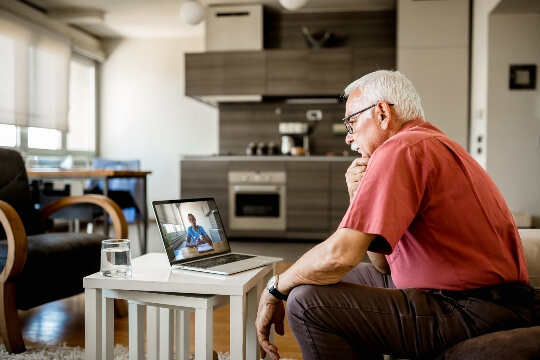Emotional Support for Mesothelioma Patients Takes New Direction
Health & WellnessWritten by Melanie Ball | Edited By Walter Pacheco

People in the mesothelioma community usually hear about various emotional support options during visits with their cancer treatment team.
Doctors commonly treat patients using a holistic approach, allowing them to address all areas of a patient’s health. Physicians may incorporate physical, spiritual, emotional, dietary and other elements of care into cancer treatment.
Addressing health concerns throughout the body may help mesothelioma patients in their fight against cancer.
As a therapist, I am interested in people’s emotional well-being, which is especially important for people dealing with challenging illnesses.
Cancer patients and their families might consider counseling for emotional support while navigating a mesothelioma cancer diagnosis and treatment.
Cancer Patients Face Additional Stress
There are many pieces of dealing with cancer that create additional stressors that can lead to emotional manifestations.
Sometimes treatment teams refer patients and their families for additional emotional supports such as patient-caregiver support groups and counseling.
Concerns related to COVID-19 have impacted the field of mental health in some big ways. Due to exposure risks, many clinicians decreased in-person services or eliminated them altogether.
Therapists from all over the United States transitioned to “telebehavioral health” services to maintain continuity of care while continuing virus mitigation efforts.
Perhaps the challenge for cancer patients seeking emotional support is a lack of familiarity with telehealth services. Learning about available mental health services may link patients with much-needed emotional supports.
What Is Telehealth?
Accessing medical and mental health care services from home is sometimes called telehealth care, or telebehavioral health, but these types of services have many other names.
Teleservices are not a new concept, as such services are a long-established means of continuing distance health care.
The current global health crisis helped launch clinical professions into a virtual setting. In my clinical practice, I use “live-synchronous” video connections to meet with individuals and families and engage in therapeutic services. Through various digital platforms, people can comfortably access mental health providers, members of their oncology teams and their family doctor while staying safe at home.
Throughout the transition to virtual behavioral health services, professionals and participants alike discovered challenges in accessing care. One such challenge is the lack of understanding of how technology is used during visits with providers.
Other barriers might include difficulties operating a device like a smartphone or a laptop computer. Helping professionals can assist those seeking services in overcoming barriers to accessing much-needed care.
Accessing Emotional Supports
For mesothelioma patients and their families seeking counseling services, there are many options for incorporating emotional supports into cancer care.
Some oncology care centers are staffed with mental health professionals prepared to address the needs of patients and families. Others refer individuals to outside helping professionals.
Exploring available services and various means of accessing services can be a helpful part of comprehensive cancer care.
Cancer patients with established oncology treatment teams likely gain access to emotional supports through discussing their needs with team members. Depending on the patient and family’s situation, they may introduce a support group, counseling or other resources to help.
If the team decides a referral for mental health counseling is appropriate, they will coordinate an initial intake appointment either from within the team or by referring to a qualified health care professional. The referral initiates the process of accessing mental health care.
Upon obtaining a referral, an intake appointment is scheduled. Initially, clinicians work to gather information about a client through an assessment that explores background information, medical and psychological history and a detailed survey of current environmental stressors.
From there, clinicians and clients develop a plan to address the client’s needs and begin building a team to form a circle of supports. Individuals and therapists work together to decide what treatment may be appropriate, determine adequate treatment goals and plan the right course to achieve a higher quality of life.
Cancer patients, caregivers and family members have advantageous opportunities through innovative emotional support options. Seeking care from a licensed mental health care provider has never been easier.
Accessing care can now be as simple as clicking a link in an email or text, or by entering a code to join a video meeting. Patients can participate in a comprehensive evaluation, assessment, treatment planning, clinician-led support groups, medication management and assistance in dealing with crisis situations.
How Counseling Can Help Patients
Hearing a doctor say, “it’s cancer,” is an emotionally taxing experience. Patients and their loved ones may feel flooded with different emotions such as shock, anger, emptiness, sadness and more.
The toll on a person’s mental health while experiencing cancer and treatment is widely evident – just ask any family dealing with it. Counseling can help patients and families identify stressors, develop strategies to manage emotional experiences, process and resolve crises and improve their health.
When people feel overwhelmed by their daily life experiences, it is essential to address their emotional state. Fighting cancer is an arduous task in and of itself, but fighting cancer while feeling emotionally drained creates the perfect conditions for a mental health crisis.
While patients work to eradicate the cancer cells from their bodies, they must also provide their bodies with the emotional supports necessary to assist in fighting off sickness.
It is also important to understand and address the impact cancer has on friends, family members and loved ones. There is an intense emotional response from loved ones upon seeing a family member’s health decline due to cancer.
Having a professional assist in processing those difficult feelings can ease the pain of dealing with a loved one’s cancer battle. Many oncology teams offer emotional support services to caregivers and loved ones as part of a patient’s cancer care.
It is normal to experience big emotions when dealing with difficult issues such as cancer. Accessing available emotional supports may be the first step toward improving one’s quality of life.






